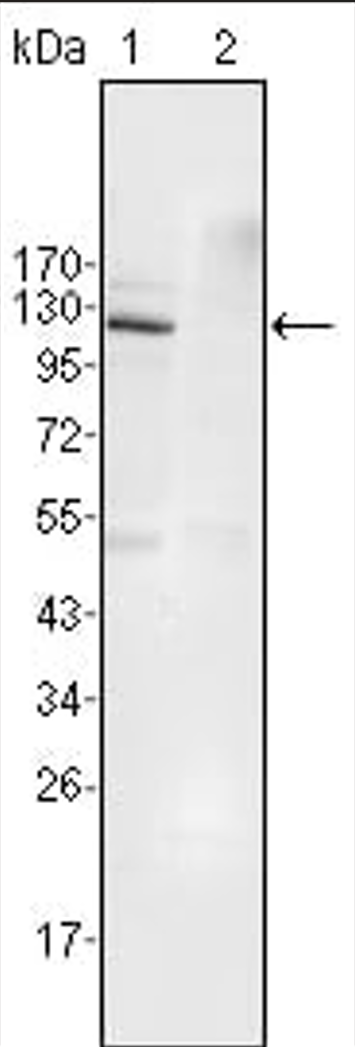
| WB | 1/500 - 1/2000 | Human,Mouse,Rat |
| IF | 咨询技术 | Human,Mouse,Rat |
| IHC | 咨询技术 | Human,Mouse,Rat |
| ICC | 技术咨询 | Human,Mouse,Rat |
| FCM | 咨询技术 | Human,Mouse,Rat |
| Elisa | 1/10000 | Human,Mouse,Rat |
| Aliases | HTK; MYK1; TYRO11 |
| Entrez GeneID | 2050 |
| clone | 7H4A6 |
| WB Predicted band size | 108kDa |
| Host/Isotype | Mouse IgG1 |
| Antibody Type | Primary antibody |
| Storage | Store at 4°C short term. Aliquot and store at -20°C long term. Avoid freeze/thaw cycles. |
| Species Reactivity | Human |
| Immunogen | Purified recombinant fragment of EphB4 (aa562-612)expressed in E. Coli. |
| Formulation | Purified antibody in PBS with 0.05% sodium azide. |
+ +
以下是3篇关于EphB4抗体的代表性文献摘要:
1. **文献名称**: *"EphB4 suppresses vessel branching in tumor angiogenesis through modulation of endothelial cell signaling"*
**作者**: Martiny-Baron et al.
**摘要**: 该研究证明EphB4抗体通过阻断EphB4与配体ephrin-B2的相互作用,抑制肿瘤血管异常分支,降低血管密度,从而延缓小鼠模型中结直肠癌和黑色素瘤的生长。
2. **文献名称**: *"Targeting EphB4 with antibody-based therapeutics potently inhibits tumor growth"*
**作者**: Xiao et al.
**摘要**: 研究者开发了一种人源化EphB4单克隆抗体,发现其能特异性结合EphB4胞外域,阻断下游STAT3和Akt信号通路,在乳腺癌和肺癌异种移植模型中显著抑制肿瘤细胞增殖并诱导凋亡。
3. **文献名称**: *"Therapeutic potential of EphB4 monoclonal antibody in preclinical models of ovarian cancer"*
**作者**: Kertesz et al.
**摘要**: 该文献报道EphB4抗体通过抑制肿瘤细胞自主性信号(如MAPK通路)和微环境中的血管生成,显著延长卵巢癌模型小鼠生存期,且与化疗药物表现出协同效应。
备注:如需具体文献来源或更新研究,建议通过PubMed或Web of Science检索关键词“EphB4 antibody”并筛选近年高被引论文。
EphB4. a member of the Eph receptor tyrosine kinase family, plays critical roles in vascular development, cell adhesion, and tissue boundary formation by binding to its ligand ephrin-B2. It is composed of an extracellular ligand-binding domain, a transmembrane region, and a cytoplasmic kinase domain. EphB4-ephrin-B2 signaling regulates angiogenesis, particularly in establishing arterial-venous differentiation during embryogenesis. Dysregulation of EphB4 is implicated in pathologies, including cancer, where it can exhibit both tumor-suppressive and pro-oncogenic effects depending on cellular context.
EphB4 antibodies are tools designed to target and modulate EphB4 activity. In research, they are used to block EphB4-ephrin-B2 interactions, study downstream signaling pathways, or detect EphB4 expression in tissues. Therapeutically, EphB4 antibodies are explored for cancer treatment, aiming to inhibit tumor angiogenesis, metastasis, or survival. Preclinical studies highlight their potential in breast, colorectal, and ovarian cancers. Some antibodies act as antagonists to disrupt pathological signaling, while others may agonize receptor clustering to induce apoptosis. Challenges include balancing specificity and minimizing off-target effects. Current efforts focus on optimizing antibody engineering (e.g., humanized formats) and evaluating combinatorial therapies. Despite no approved drugs to date, EphB4 remains a promising target, with ongoing clinical trials assessing antibody-based strategies in oncology.
×